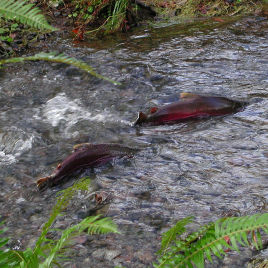Researchers examined 39 years of data about a British Columbia population of Song Sparrows to identify patterns in how and why nesting success changed over time. The researchers found that factors such as rainfall, population density, and nest parasitism interacted in complex ways, with their effects waxing and waning, and that inbreeding became a significant […]
Tag: British Columbia

Salmon like the dark side
Salmon living in tanks with darker backgrounds are typically less aggressive than those living in a lighter coloured environment, according to new research. The researchers divided 100 Coho Salmon into 10 different tanks, each with different colour patterns, and monitored their behaviour. They found that the salmon prefered the darker areas, and were less aggressive […]

How the hummingbird turns
Hummingbirds control their turning velocity and radius using body orientation and asymmetrical wingbeats, according to a new study. Using a feeder tracking experiment researchers found the birds control their turning velocity by altering their physical orientation, and control their turning radius by beating their wings at slightly different speeds. Researchers filmed six adult male […]
How infants account for dominance
Group size matters when determining who is dominant, at least according to human infants. The team believes this shows infants as young as six months of age are able to assess social dominance by looking at the numerical size of competing groups, an ancient evolutionary ability. Researchers found infants evaluate which group is dominant by […]
Biologics and Biosimilars | SMCC Webinar
Biologics and Biosimilars | SMCC Webinar | January 7, 2016 | Video available Biopharmaceuticals, or Biologics have successfully improved the care of several hard to treat conditions, such as rheumatoid arthritis, Crohn’s disease and cancer. More of these complex biological drugs are coming. In the US over 900 biologics are being developed for more than 100 diseases. While they […]
The backwards effects of warming
Manipulating the food-web to reduce carbon-dioxide emissions may have the opposite effect under a warmer climate, according to a new study. Under certain conditions increasing water temperatures can cause what are called ‘trophic cascades’ – These occur when a population increase or decrease in a one species impacts other species in the food-chain, by making […]
Increasing risk of coastal erosion from El Niño
Coastal areas around the pacific will be at increased risk of erosion and flooding if a projected increase in extreme El Niño and La Niña events occurs, according to a new study. Researchers found that observed coastal erosion across the Pacific varies closely with El Niño events, independent of changes in sea-level rise. The researchers […]
Current dietary protein recommendations are too low
Recommendations for protein intake in healthy populations may be incorrect, according to researchers who point to a meta-analysis reviewing the latest findings. Current recommendations may not be sufficient to promote optimal muscle health, especially in aging populations prone to muscle loss. Consuming moderate amounts of high-quality protein at each meal, rather than a larger quantity once […]
Small cell lung cancer occurs when two genes are switched off
Using whole-genome sequencing researchers found that small cell lung cancer (SCLC) occurs when both copies of two separate genes responsible for tumor suppression are switched off. The research team hopes this discovery will help the development of new treatments for SCLC, which usually results in patient-death within months. Researchers sequenced the genome of 110 tumor […]

Complex eye found in single-celled organism
Researchers have found many of the components required for a complex eye in a single-celled organism, providing insight into the evolutionary origins of the eye. The findings show how a complex system can evolve in a simple organism. The research team examined warnowiids, a single-celled organism, and found that they have ocelloids, an eye-like structure […]
Comparing current and reduced carbon emissions shows benefit for the ocean 
Researchers compared the effects of two different carbon emissions trajectories and found that reducing emissions to levels required to meet the Copenhagen Accord shows benefits in many areas for the world’s oceans. The research team found that if carbon emissions are mitigated the oceans will be cooler and less acidic. However if carbon emissions maintain […]
Monitoring a new avian influenza strain in B.C.
Canadian researchers will launch a novel project to shed light on the source of a deadly H5N2 strain responsible for the death and destruction of approximately 240,000 birds in B.C between December 2014 to January 2015. The project funded by Genome BC, Genome Canada, Agriculture Canada and the Canadian Food Inspection Agency will seek to […]
Do you have eco-friendly friends?
Canadians with personal ties to members of environmental organizations are more likely to engage in eco-friendly behaviours such as recycling and buying a more fuel-efficient car than those with no such ties, according to a new study. Using data from two surveys carried out in Canada in 2007, researchers conclude that individual-level social connections to […]

Canada’s disappearing glaciers
Glaciers in western Canada are projected to lose 70 per cent of their ice volume by 2100, relative to 2005, according to a new study. Using simulations which model the effect of global warming, researchers demonstrated that Canadian glaciers will experience the same shrinkage as mountain glaciers in other places around the world. A few […]

Hummingbirds could improve drones’ stability
Albatrosses, airplanes, and helicopters all share long narrow wings which provide good aerodynamic efficiency. In contrast the wings of hummingbirds are short and stubby. Conventional aerodynamic theory predicts this should makes them inefficient. In a new study, researchers resolved some of the contradiction by finding that while slender wings are indeed most efficient at a […]
Universal pharmacare could save Canada billions each year
Using data quantifying Canadian prescription drug use and spending, researchers believe that Canada could save up to $9.4 billion a year by switching to a universal pharmacare program. The researchers analysed prescription drug data from the 2012-2013 fiscal year and determined that if Canada were to switch to a universal program, the economic savings would […]
